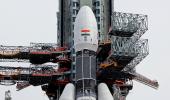India is attempting to soft-land a rover on the moon and will attempt, at some point next year hopefully, sending humans into orbit.
All of this makes an exciting time for space around the world, notes Aakar Patel.

In the dozen years between 1957 and 1969, the Americans and the Russians went on a series of space races. The Russians won almost everything at first.
They were to first to send a satellite into orbit (Sputnik in 1957), the first to send a living thing into space, the dog Laika in the same year, the first to send a person into orbit (Yuri Gagarin in 1961).
The first person to 'walk' in space, meaning exit the spacecraft while in orbit was Alexei Leonov in 1965.
After this the US registered its first win in 1969 when it was able to land humans on the moon.
The US remains the only nation to be able to do this and last did it in 1972.
The Soviets tried and failed to develop a large rocket and so the space race ended in the early 1970s.
For 50 years there has been no interest in moon landings with humans because the cost is very high and the American public lost interest.
The Space Shuttle programme was seen as a lower-cost, reusable way for America to send its astronauts into orbit and to the International Space Station.
However, two disasters, one in the 1980s and another in the early 2000s (in which Kalpana Chawla was killed) and unexpectedly high costs ended the programme over a decade ago.
After that America did not even have the capacity to send humans into orbit, something that changed only in 2020 when a private firm was able to begin its service.
Russians still fly rockets based on the same technology that was used in the 1960s, with some modifications and much of the technology in the space race came from Nazi Germany's military rocket program of 90 years ago.
The captured scientists on the two fronts were pressed into service by the Americans and the Russians.
One reason why space innovation was stagnant for so many decades is that it was funded by governments which were spending large amounts on nationalistic projects.
Even today the budget for NASA, the US space agency is $25 billion.
ISRO's budget is about $1.5 billion, which makes its achievements over the decades quite remarkable.
This changed about 15 years ago, when it became clear that satellite communications, GPS and the Internet were going to be very big drivers in the economy.
Private firms began to take an interest first in developing the technology that would go into satellites and then to build rockets.
This second shift happened after the US government funded space start-ups and allowed them under conditions to develop rocket technology.
Because rockets are no different from missiles, their development and manufacturing is tightly controlled.
Only US citizens, for instance, can work at these firms.
This limits the amount of talent they can absorb but is one way that the government can ensure the technology does not reach what it considers to be the wrong hands.
Even with these restrictions, the private sector has breathed new life into the space sector.
Another, much smaller, space race began after the US government's funding between two firms to launch the first human to orbit on a private rocket.
Boeing, the giant company, lost out to the younger SpaceX, though it had received more funding than the start-up.
Today, the rockets are reusable to a large extent and at least two firms are building giant rockets of the size that existed 50 years ago.
The target is two-fold, the first is to lower the cost of space and reduce the cost per kilogram of putting things into orbit.
The second is human spaceflight and attempting to colonise Mars.
Imagine what a difference it will make to the world if there is an outpost humans create on another planate.
Of course this will be difficult: Even today in 2023, the number of entities that have sent humans into orbit around the earth is limited to Russia/USSR, America, China and the company SpaceX.
The winners in the race this time stand to make large amounts of money (SpaceX, which is privately held, is valued at over $100 billion) and also own technology that will help them monopolise space.
Efficient rocket engines, new fuels, highly complex aspects of reusability and fuel transfers make this the domain of a very few entities.
The cost of launching a satellite runs into hundreds of crores of rupees.
The monopoly over space will mean that particularly on the commercial side, that is to say satellite launches, will be controlled by companies or nations that others will have no option but to go to.
Even the UK and Germany today have no launch capacity and are dependent on either private entities of their ally the US to launch.
France's Ariane programme is currently dormant after it eased out its older rocket and is developing a new one.
All of this makes this an exciting time for space around the world.
This is the background in which India is attempting to soft-land a rover on the moon and will attempt, at some point next year hopefully, sending humans into orbit.
By the end of this decade, we will have a good idea of which nations and which companies are winning this new space race, and what that means for the future not just of science and technology but of humans as a whole.
Aakar Patel is a columnist and writer and you can read Aakar's earlier columns here.
Feature Presentation: Aslam Hunani/Rediff.com










